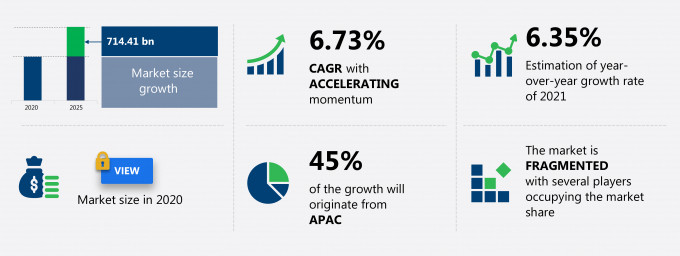The automotive battery management system market share is expected to increase by USD 714.41 billion from 2020 to 2025, and the market’s growth momentum will accelerate at a CAGR of 6.73%.
This automotive battery management system market research report provides valuable insights on the post COVID-19 impact on the market, which will help companies evaluate their business approaches. Furthermore, this report extensively covers automotive battery management system market segmentations by type (lithium-ion and others), application (hybrid electric vehicles, battery electric vehicles, and other vehicles), and geography (APAC, Europe, North America, South America, MEA, APAC, Europe, North America, South America, and MEA). The automotive battery management system market report also offers information on several market vendors, including Contemporary Amperex Technology Co. Ltd., Continental AG, DENSO Corp., HELLA GmbH & Co. KGaA, Infineon Technologies AG, Johnson Matthey Plc, JTT Electronics Ltd., LG Chem Ltd., Lithium Balance AS, and Marelli Holdings Co. Ltd. among others.
What will the Automotive Battery Management System Market Size be During the Forecast Period?
Download the Free Report Sample to Unlock the Automotive Battery Management System Market Size for the Forecast Period and Other Important Statistics
Automotive Battery Management System Market: Key Drivers, Trends, and Challenges
Based on our research output, there has been a NEGATIVE impact on the market growth during and post COVID-19 era. The increasing demand for electric and hybrid vehicles is notably driving the automotive battery management system market growth, although factors such as non-uniformity in standards may impede market growth. Our research analysts have studied the historical data and deduced the key market drivers and the COVID-19 pandemic impact on the automotive battery management system industry. The holistic analysis of the drivers will help in deducing end goals and refining marketing strategies to gain a competitive edge.
Key Automotive Battery Management System Market Driver
Use of communication protocols and smart sensors is the major driver influencing the automotive battery management system market growth. Automotive battery management systems are increasingly being upgraded with advanced technologies to increase the battery life of electric vehicles. The power retaining capacity of an electric vehicle battery is a major factor determining the effective life cycle of an electric vehicle. Hence, OEMs are employing the use of advanced local interconnect network (LIN) and intelligent battery sensors to increase the efficiency of battery management systems in vehicles. Intelligent battery sensors will precisely gauge the amount of current needed on demand along with accurate readings of temperature and voltage of the battery. They use a LIN communication protocol to send inputs regarding the health of the battery and power discharge to the electronic control unit (ECU) of the vehicle. The use of intelligent sensors that communicate using LIN protocols increases the technological effectiveness of automotive battery management systems.
Key Automotive Battery Management System Market Trend
The increasing adoption of intelligent automotive battery management systems is the major trend influencing the automotive battery management system market growth. The emergence of intelligent automotive battery management systems is one of the key automotive battery management system market trends. The power efficiency of electric vehicles depends on the amount of load the vehicle is required to carry at a point of time.Carrying increased amounts of load depletes the battery life cycle and increases the number of charging cycles.Automotive battery management system players are developing systems that offer a balance between the power supplied for a vehicle's operation based on the load.Players in the market are developing a type of automotive battery management system for high-performance electric or hybrid cars to alter the flow of current for improving the life of the battery during frequent charging cycles.Intelligent automotive battery management systems can monitor the condition of individual battery cells and take actions to enhance the power retaining the capacity of the vehicle battery.
Key Automotive Battery Management System Market Challenge
Complexity in designing automotive battery management systems is the major challenge hindering the automotive battery management system market growth. Automotive battery management system is a highly complex technology that measures all factors of individual battery cells and transmits the information to the control unit of the vehicle using a communication protocol. Hence, the design of an automotive battery management system becomes highly complicated with the advances in electric vehicle technology. Automotive battery management systems should be designed to work at a wide range of temperatures. They should sense low and high cell temperatures to detect the health of each battery cell. These systems also take logs in real-time for diagnostics and determine the best course of action for extending the life of a battery. Vendors generally use parallel and series-connected battery cell structures to increase the effectiveness of automotive battery management systems. However, the complexity in designing an automotive battery management system for balancing multiple battery cells may pose a major technical challenge to the growth and adoption of advanced automotive battery management systems during the forecast period.
This automotive battery management system market analysis report also provides detailed information on other upcoming trends and challenges that will have a far-reaching effect on the market growth. The actionable insights on the trends and challenges will help companies evaluate and develop growth strategies for 2021-2025.
Parent Market Analysis
Technavio categorizes the global automotive battery management system market as a part of the global auto parts and equipment market within the global auto components market. Our research report has extensively covered external factors influencing the parent market growth potential in the coming years, which will determine the levels of growth of the automotive battery management system market during the forecast period.
Who are the Major Automotive Battery Management System Market Vendors?
The report analyzes the market’s competitive landscape and offers information on several market vendors, including:
- Contemporary Amperex Technology Co. Ltd.
- Continental AG
- DENSO Corp.
- HELLA GmbH & Co. KGaA
- Infineon Technologies AG
- Johnson Matthey Plc
- JTT Electronics Ltd.
- LG Chem Ltd.
- Lithium Balance AS
- Marelli Holdings Co. Ltd.
This statistical study of the automotive battery management system market encompasses successful business strategies deployed by the key vendors. The automotive battery management system market is fragmented and the vendors are deploying growth strategies such as organic and inorganic strategies to compete in the market.
To make the most of the opportunities and recover from post COVID-19 impact, market vendors should focus more on the growth prospects in the fast-growing segments, while maintaining their positions in the slow-growing segments.
The automotive battery management system market forecast report offers in-depth insights into key vendor profiles. The profiles include information on the production, sustainability, and prospects of the leading companies.
Automotive Battery Management System Market Value Chain Analysis
Our report provides extensive information on the value chain analysis for the automotive battery management system market, which vendors can leverage to gain a competitive advantage during the forecast period. The end-to-end understanding of the value chain is essential in profit margin optimization and evaluation of business strategies. The data available in our value chain analysis segment can help vendors drive costs and enhance customer services during the forecast period.
The value chain of global auto parts and equipment market includes the following core components:
- Inputs
- Inbound logistics
- Operations
- Outbound logistics
- Marketing and sales
- Service
- Support activities
- Innovation
The report has further elucidated on other innovative approaches being followed by manufacturers to ensure a sustainable market presence.
Which are the Key Regions for Automotive Battery Management System Market?
For more insights on the market share of various regions Request for a FREE sample now!
45% of the market’s growth will originate from APAC during the forecast period. China and Japan are the key markets for the automotive battery management system market in APAC. Market growth in this region will be slower than the growth of the market in other regions.
The presence of significant numbers of electric and hybrid vehicles equipped with automotive battery management systems in Japan, China, and South Korea will facilitate the automotive battery management system market growth in APAC over the forecast period. This market research report entails detailed information on the competitive intelligence, marketing gaps, and regional opportunities in store for vendors, which will assist in creating efficient business plans.
What are the Revenue-generating Type Segments in the Automotive Battery Management System Market?
To gain further insights on the market contribution of various segments Request for a FREE sample
The automotive battery management system market share growth by the lithium-ion segment will be significant during the forecast period. Lithium-ion (Li-ion) batteries are generally preferred in electric vehicles as they have increased power density, which allows them to retain a larger amount of power as compared with lead-acid and nickel-metal hydride (Ni-Mh) batteries. This factor has played a significant role in contributing to the automotive battery management system market share.
Besides the above-mentioned factors, the post COVID-19 impact has brought forth a slowdown in or fast tracked the demand for the service or product. This report provides an accurate prediction of the contribution of all the segments to the growth of the automotive battery management system market size and actionable market insights on post COVID-19 impact on each segment.
|
Automotive Battery Management System Market Scope |
|
|
Report Coverage |
Details |
|
Page number |
120 |
|
Base year |
2020 |
|
Forecast period |
2021-2025 |
|
Growth momentum & CAGR |
Accelerate at a CAGR of 6.73% |
|
Market growth 2021-2025 |
USD 714.41 billion |
|
Market structure |
Fragmented |
|
YoY growth (%) |
6.35 |
|
Regional analysis |
APAC, Europe, North America, South America, MEA, APAC, Europe, North America, South America, and MEA |
|
Performing market contribution |
APAC at 45% |
|
Key consumer countries |
China, US, UK, and Japan |
|
Competitive landscape |
Leading companies, Competitive strategies, Consumer engagement scope |
|
Key companies profiled |
Contemporary Amperex Technology Co. Ltd., Continental AG, DENSO Corp., HELLA GmbH & Co. KGaA, Infineon Technologies AG, Johnson Matthey Plc, JTT Electronics Ltd., LG Chem Ltd., Lithium Balance AS, and Marelli Holdings Co. Ltd. |
|
Market dynamics |
Parent market analysis, Market growth inducers and obstacles, Fast-growing and slow-growing segment analysis, COVID 19 impact and recovery analysis and future consumer dynamics, Market condition analysis for forecast period |
|
Customization purview |
If our report has not included the data that you are looking for, you can reach out to our analysts and get segments customized. |
What are the Key Data Covered in this Automotive Battery Management System Market Report?
- CAGR of the market during the forecast period 2021-2025
- Detailed information on factors that will drive automotive battery management system market growth during the next five years
- Precise estimation of the automotive battery management system market size and its contribution to the parent market
- Accurate predictions on upcoming trends and changes in consumer behavior
- The growth of the automotive battery management system industry across APAC, Europe, North America, South America, MEA, APAC, Europe, North America, South America, and MEA
- A thorough analysis of the market’s competitive landscape and detailed information on vendors
- Comprehensive details of factors that will challenge the growth of automotive battery management system market vendors
We can help! Our analysts can customize this report to meet your requirements. Get in touch



